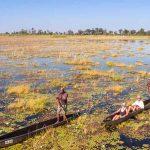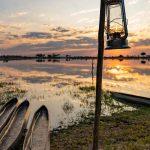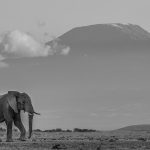Ruaha National Park is Tanzania’s second largest, just behind Serengeti. But it is among the least seen of the country’s parks, with only 2,000 visitors a year.
Click to see video of Ruaha National Park
Unlike Serengeti and Ngorongoro Crater, where traffic jams of safari cars form during high season, it’s rare to see another vehicle in Ruaha. There are no towns or hotels nearby. Accommodations in the park hold only about 150 people. In a park that’s as big as Massachusetts, animals vastly outnumber people.
Straddling two regions — southern and East Africa — Ruaha plays host to an unusual mix of animals.
The park is home to more than 400 species of birds — the most of any East African park. The names of the birds are often as amazing as their plumage: Picture red-billed oxpeckers, wing-snapping cisticolas and spotted thick-knees, and you’ll know what I mean.
I marked off a depressingly scant 30 species of birds on my checklist, although I saw many more than that. My proudest sighting: an ostrich, the world’s largest bird. That should count for something extra.
I visited the park in April, during the rainy season, which is probably the best time for seeing wildflowers and birds but the worst for sighting big animals. The rains produce tall grass and thick foliage that screen the animals from view. Potholes everywhere fill up with water, so the grazing animals — impala, eland, zebra, kudu, sable — are able to disperse throughout the park. With them go the lions, leopards and cheetahs. Most tourists hit the safari trail in January and February, when the weather in Africa is hottest and driest. Vegetation withers, the water holes dry up and animals flock to the remaining rivers and lakes, where they’re easier to see. July through September is also a good time for big game viewing.
Guides in Ruaha said that during the dry seasons, it is common to see lions and leopards drinking right at the two lodges where I stayed (both were on rivers — Mwagusi Camp on the Mwagusi River and Ruaha River Lodge on the Ruaha River). Both of these lodges have their bandas, or thatched lodgings, built close to the rivers to maximize your chances of seeing and hearing wildlife, even when you’re not out looking for it.
Going on safari
There are many ways to plan a safari, ranging from a completely independent trip (a fraction of the cost but harder to arrange) on up to complete package deals that take care of every detail.
Start by doing some research. Tanzania — safe, accessible and rich in wildlife — is one of the most popular options.
Both lodges are run by the Fox family, which has deep roots in Tanzania. I spent two nights at each place. Mwagusi Camp is more intimate, with a maximum of 20 guests staying in posh tents by a slow-moving river. Ruaha River Lodge holds about 60 guests, who stay in stone huts spread out along a scenic stretch of the river. One of the main attractions at River Lodge is a bar/dining area built on a rocky hill with a stunning overview of the river valley. Both places offer special touches that take the rough edges off the “wilderness experience.” At Ruaha River Lodge, a waiter brought coffee and biscuits to my room at sunrise so I could eat on my veranda while admiring the passing cape buffalo, giraffe and waterbuck watering in the river, which ran a dozen yards from my front door.
The food at both places is excellent, with imaginative preparations of locally grown produce, chicken and beef. I also had some excellent fresh fish at Ruaha River Lodge — really fresh: I watched the maitre d’ catch it during his afternoon break.
Mwagusi Camp has an excellent Web site at http://www.ruaha.org . There you’ll find more information on the park, on the accommodations and on making arrangements to get there. Two small airlines fly direct from Dar es Salaam to Ruaha, making it pretty easy. Ruaha River Lodge is listed on the Tanzania Tourist Board’s Web site, which is a handy resource for trip planning. That’s at
http://www.tanzania-web.com.
Organized trips to both lodges can be booked through Tanzania Odyssey in London. The phone number is 44-171-471-8780. The agency’s Web site is http://www.tanzaniaodyssey.com






